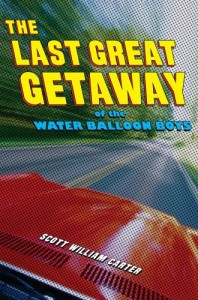I recently received news that my second collection, The Dinosaur Diaries And Other Tales Across Space And Time, will soon be available for purchase from Amazon, Barnes and Noble, and all your other major bookstore outlets. This means that my other collection, A Web of Black Widows, which is already available for preorder, will be published at almost the same time. It probably would have been better to separate their publication dates by a month or two, but hey, I can’t complain. My hope was to have them out before my first book was published and it looks like we’ll beat that deadline .
Anyway, as part of my promotional efforts, I’d like to share with you one of the stories included in the Dinosaur Diaries collection: “Shatterboy,” which originally appeared in the November 2005 issue of Cicada magazine — and for free, to boot. (Of course my hope is that you’ll buy the collection when it’s available.)

Shatterboy
Scott William Carter
The day her husband of thirty-six years filed for divorce, Rebecca Wilson found the glass boy at the recycling transfer station on the corner of 25th and Jefferson.
He was there at the back of the bin marked GLASS ONLY, his translucent body swathed in saran wrap and couched in a bed of foil. A ring of root beer bottles surrounded him like perfectly-shaped stalagmites. If it hadn’t been for the pen light in her mouth, casting a narrow beam on ten agate-like toes, she surely would have missed him. Later, she would thank her lucky stars she had the presence of mind — after getting off the phone with her husband’s lawyer — to grab her purse on her way out the door. Her cheeks puffy and stinging, and dressed only in the green terrycloth robe, she had driven aimlessly for hours. The clinking from the back seat made her remember — oh, yes, need to drop off the recycling, need to get that done right now — and she had driven straight to the transfer station.
Now, standing there with her slippers steeped in a puddle of gasoline, a wet breeze on her legs, she pushed her paper sack of bottles aside. Her first thought, with what little she could see, was that it was some kind of collectible doll. Braving the scent of stale beer and the stickiness of pop bottles, she leaned against the wood panel and reached for the glass toes.
They moved.
It wasn’t much, just a wiggle, but it was so unexpected that she lurched back. She shined her pen light deeper into the bin. The feet, and the legs to which they were attached, were definitely moving. She saw glass arms rise above the root beer bottles and glass fingers grasp at the air.
It giggled. It was a giggle as real as any baby giggle. It was so real her apprehension slipped away, and she lunged into the bin and pulled out the lump of foil. It felt no heavier than the foil itself. Shining her light on it, she saw that was indeed a boy made entirely of glass — a boy that cooed when she touched her forefinger to his smooth, cool belly.
His body was as clear as an empty fishbowl. She saw the bulges her fingers made in the foil beneath. He reached for her, arms swinging up like those of a marionette, and when his fingers came together they clinked like champagne glasses coming together in a toast.
She took him home.
Fifty-four, childless, and so lonely in her condominium the last eight months she had long conversations with her great grandmother’s teak clock, Mrs. Rebecca Wilson took the appearance of the glass boy as a gift for the many years she suffered with Don, her husband. The night Don moved out, he frankly admitted he cared more about Arnold Palmer and Tiger Woods and every golfer in between than he had ever cared about her. Still, if it hadn’t been for his insistence on drinking beer out of glass instead of aluminum, she never would have found the glass boy. In a way, Don had given her this child.
She retrieved the oversized crib from the attic she had inherited from her mother, dusted off the thin mattress, and placed the boy inside. That first night she did not sleep, instead sitting wrapped in a wool shawl in her rocker, watching how the orange nightlight made his skin glow.
In the morning, he had grown, and he was as tall as a two-year old.
He walked. His knees did not bend so he walked about as if on stilts. He loved to stand in the sunlight and watch the motes of dust float through his own body. His murmuring and babbling shaped into words.
“Mom!” he said, pointing at her.
The third day, he was as big as a four-year old, and they played hide and seek. The boy always won because she could look right past him and not see him standing there in front of the lavender curtains.
The day after that, he learned that instead of lurching through the house, he could glide over the carpet and the vinyl like an Olympian figure skater, and was so beautiful when he did that it left her speechless.
On the fifth day, the boy came to understand that other children his age did not stay home all day, but instead went to school.
“Why can’t I go to school, Mom?” he asked.
“Oh, my sweet boy,” Rebecca said, hugging him gently. “Oh, I would let you go, I would — but you see, you are made of glass. ”
To anyone else, the boy’s face would have been impossible to read, but Rebecca was attuned to the subtle changes, the way the glass tinted every so slightly.
“Please don’t be sad,” she said. “Please, it will make me cry.”
“But I want to go to school, Mom,” he said. “I want to play with other kids. What does being made of glass have to do with it?”
Because she loved the boy, because she wanted to make an impression on him that would last, she went to the cupboard and pulled out one of her most precious wine goblets.
“This is why,” she said, and dropped it.
She could not be sure if the boy screamed after the glass shattered or in anticipation of it, but both sounds filled her ears at once. The shards skittered across the floor. The boy looked at her, horror stricken, then ran out of the room. As she swept up the remains of the goblet, she hated herself for making him feel that way, but she knew she had to keep him with her, where he was safe, where he was loved.
On the fifth day, he was more the size of a man, and too self-conscious to run around the house naked, so she rolled up her husband’s old shirts and pants and let him wear those.
Coming into the room, she expected to see him sitting in the rocker, but he wasn’t there. She called his name and there was no answer. She ran through the house and all the rooms were empty. When she passed the front door, she saw a note taped to it, a note written in his jagged penmanship, all straight lines and no curves:
Mom, went to the park to play with other kids. Don’t worry. be home soon.
When she got there, she saw him in his oversized clothes atop the jungle gym. At first glance it looked like the clothes stood there by themselves, the orange and red leaves of the oaks behind him clearly visible through his head and arms. The other children, at least a dozen of them, had him surrounded. They were shaking the jungle gym, and her boy was clinging to the top.
Climbing out of the car, she heard them chanting.
“Shatterboy! Shatterboy! Shatterboy!”
She was going to shout, but before she could summon the words, he looked up. He saw her. He raised a hand, either a wave or a call for help, and when he did he lost his balance. Like the wine goblet she once dropped for him, he fell swift and straight. Her slim hope that he would be fine, that the bark chips were not as hard as they looked, shattered just as his body shattered into a dozen pieces.
The children scattered. She went to the pile, walking in a daze, and gathered up the broken pieces in her sweater. She took him home. She placed the pieces in the middle of her living room floor, her body shaking, and settled into the rocker. Her whole life stretched out before her, dark and unknown.
After only a few minutes, the shards trembled. They stirred, they slid, they moved together. There was a snapping and a dinging and a ringing and then it was all together — connected, totally whole, no seams or scars or signs of his accident. He rose unsteadily to his feet, her glass boy, almost a glass man.
“A miracle,” she said.
She didn’t know if it was pity or sadness she saw. He put his hand on her shoulder and stood there, a tall, gleaming, beautiful young man, then strode to the door. It had been left open, and the gray clouds in the gray sky shuttled through his body.
“I love you, Mother,” he said.
“Don’t go!” she said. “Please, I didn’t know this would happen. I did it for you. I wanted to protect you. I wanted–”
He came back to her and silenced her with his smooth finger, and it was like the mouth of a wine bottle pressed against her lips. He turned and walked out and left her there in the rocking chair. She sat there long after he had gone, shaking, quivering, and somewhere nearby, somewhere close, hearing the sound of breaking glass.
It was only a moment before she realized that it was her own heart.
–
© Scott William Carter. Originally appeared in Cicada Magazine, November 2005. If you enjoyed this story, check out more of Scott’s work at http://www.scottwilliamcarter.com.
 If I’m going to tell you how I killed this kid, I can’t start on the day it happened. It won’t make any sense, and you’ll just think I was some psycho teenage boy with glue for brains. No, the whole thing really started three days earlier, on Monday, which made it bad straight off. It was also raining, which made it even worse.
If I’m going to tell you how I killed this kid, I can’t start on the day it happened. It won’t make any sense, and you’ll just think I was some psycho teenage boy with glue for brains. No, the whole thing really started three days earlier, on Monday, which made it bad straight off. It was also raining, which made it even worse.

